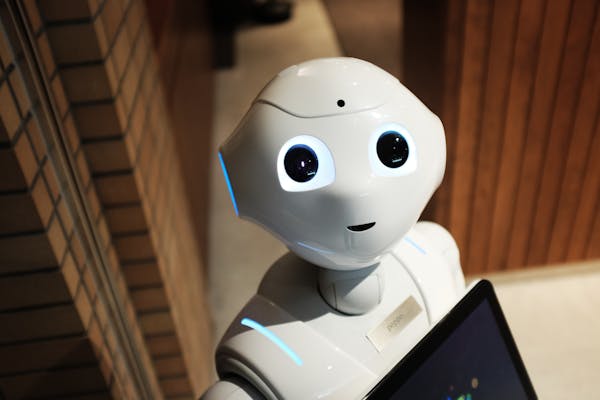Artificial Intelligence (AI) is rapidly becoming one of the most transformative technologies of the 21st century. From healthcare to finance, from manufacturing to education, AI is changing the way industries operate, streamlining processes, and enhancing productivity. It is also playing a significant role in improving the daily lives of people, from smart home systems to personalized online services. As the world continues to evolve, the advantage of artificial intelligence becomes more apparent, influencing numerous aspects of society and economy.

We will explore the vast array of benefits that artificial intelligence brings to the table. We will delve into how AI is revolutionizing various sectors, enhancing human decision-making, improving efficiency, and ultimately shaping the future of technology. The advantage of artificial intelligence extends far beyond what we initially imagined, and it is vital to understand its potential and implications.
Automation and Efficiency
One of the most widely recognized advantages of artificial intelligence is its ability to automate repetitive tasks. In industries such as manufacturing, AI-driven automation has revolutionized production lines, allowing machines to perform tasks that were once done manually by humans. AI-powered robots and systems can operate 24/7 without fatigue, significantly increasing output while maintaining consistency and precision.
- Manufacturing Application Robots controlled by AI systems can assemble products faster than human workers, reducing labor costs and minimizing human errors. Similarly, in logistics and supply chain management, AI algorithms can optimize routes for delivery trucks, ensuring that goods are transported more efficiently, reducing fuel consumption and costs.
- Industrial Application Automation powered by AI is also transforming office environments. AI can handle data entry, appointment scheduling, and customer service inquiries, freeing up human employees to focus on more strategic and creative tasks. This leads to increased productivity and a more efficient allocation of resources, allowing businesses to scale more effectively.
Enhanced Decision-Making
AI’s ability to analyze massive amounts of data and identify patterns is another key advantage of artificial intelligence. This capability is particularly valuable in sectors such as finance, healthcare, and marketing, where data-driven decisions can have a profound impact.
- Finance AI algorithms can process market data in real-time, helping traders make informed decisions about buying and selling assets. These algorithms can detect market trends and anomalies faster than any human, enabling more accurate predictions and better risk management. As a result, financial institutions can improve their portfolio management strategies, optimize trading decisions, and even reduce the likelihood of financial crises.
- Healthcare AI has the potential to revolutionize diagnostics and treatment planning. Machine learning algorithms can analyze medical records, lab results, and imaging data to assist doctors in diagnosing diseases more accurately. By identifying subtle patterns in data that may not be immediately obvious to human physicians, AI can help detect conditions such as cancer at earlier stages, improving patient outcomes. Additionally, AI can assist in developing personalized treatment plans based on an individual’s genetic makeup, lifestyle, and medical history.
- Marketing AI-driven analytics enable businesses to gain insights into consumer behavior. By analyzing data from social media, online browsing habits, and purchasing history, AI can predict customer preferences, allowing companies to deliver more targeted advertising and personalized product recommendations. This data-driven approach helps companies optimize their marketing strategies and enhance customer satisfaction.
Cost Reduction

Another significant advantage of artificial intelligence is its ability to reduce operational costs across various sectors. As AI systems take over tasks that were once performed by humans, businesses can cut down on labor expenses while maintaining high levels of accuracy and efficiency. This is particularly evident in industries where manual labor was traditionally a significant cost factor, such as manufacturing, logistics, and customer service.
- Customer Services AI-powered chatbots and virtual assistants have become a popular solution for customer support services. By automating responses to frequently asked questions and resolving common issues, AI-driven systems can reduce the need for large customer service teams. This allows businesses to provide 24/7 customer support at a fraction of the cost, improving customer satisfaction without increasing operational expenses.
- Healthcare AI can optimize administrative processes, such as patient scheduling, billing, and record management. By automating these tasks, hospitals and clinics can reduce overhead costs, allowing them to allocate more resources to patient care. Similarly, in the insurance industry, AI can streamline claims processing by automatically verifying information and flagging potential fraud cases, reducing the need for extensive manual review and investigation.
Improved Accuracy and Precision
One of the hallmark features of AI is its ability to perform tasks with a high degree of accuracy and precision. This advantage of artificial intelligence is particularly crucial in fields such as healthcare, manufacturing, and scientific research, where even small errors can have significant consequences.
- Healthcare AI is playing a vital role in improving diagnostic accuracy. For example, AI algorithms can analyze medical imaging data, such as X-rays and MRIs, to identify abnormalities that might be missed by human eyes. This can lead to earlier detection of diseases like cancer, significantly improving patient survival rates. Furthermore, AI can assist in surgeries by providing real-time data and recommendations, helping surgeons make more precise incisions and reducing the risk of complications.
- Manufacturing AI-driven robots are capable of performing tasks with millimeter-level precision. This level of accuracy is essential in the production of electronics, automobiles, and aerospace components, where even the smallest deviations can lead to product defects or failures. By ensuring a high level of consistency in production, AI helps improve the overall quality of products while minimizing waste.
- Research AI is also transforming scientific research by enabling researchers to conduct experiments with greater precision. For example, in drug discovery, AI algorithms can simulate chemical reactions and predict the behavior of molecules, speeding up the development of new medications. This reduces the time and cost associated with traditional laboratory experiments, allowing for faster advancements in medicine.
Personalization

The ability to deliver personalized experiences is another key advantage of artificial intelligence. This is particularly evident in industries such as e-commerce, entertainment, and education, where personalization can enhance user satisfaction and engagement.
- E-commerce AI-driven recommendation systems analyze customer behavior, such as browsing history and purchase patterns, to suggest products that are most likely to appeal to individual users. This level of personalization not only improves the customer experience but also increases the likelihood of repeat purchases and brand loyalty. Major online retailers, such as Amazon and Alibaba, have successfully implemented AI algorithms to enhance their recommendation engines, driving significant revenue growth.
- Entertainment AI plays a critical role in content personalization. Streaming platforms like Netflix and Spotify use machine learning algorithms to analyze user preferences and recommend movies, TV shows, and music tailored to each individual’s tastes. This personalized approach keeps users engaged with the platform and encourages longer viewing or listening sessions, ultimately increasing customer retention.
- Education AI is also making waves in the education sector by enabling personalized learning experiences. AI-driven platforms can assess a student’s learning style, strengths, and weaknesses, and then deliver customized learning materials that cater to their specific needs. This allows for more effective learning and helps students progress at their own pace, leading to better academic outcomes.
Predictive Analytics
Predictive analytics is another powerful advantage of artificial intelligence, allowing businesses and organizations to anticipate future events and trends based on historical data. AI-driven predictive models are used in various industries, including finance, healthcare, retail, and supply chain management, to make informed decisions and optimize operations.
- Finance AI-powered predictive analytics can forecast market trends, helping investors and financial institutions make better investment decisions. By analyzing historical market data and identifying patterns, AI algorithms can predict price movements and asset performance with a higher degree of accuracy than traditional methods. This enables traders to capitalize on opportunities and mitigate risks, ultimately improving financial outcomes.
- Healthcare Predictive analytics can be used to anticipate patient outcomes and identify potential health risks before they become serious. For example, AI algorithms can analyze patient data to predict the likelihood of readmission after surgery or the risk of developing chronic conditions such as diabetes. This allows healthcare providers to take proactive measures, such as implementing preventative care plans, to improve patient outcomes and reduce healthcare costs.
- Retail Predictive analytics can help businesses optimize inventory management by forecasting demand for products based on historical sales data, seasonal trends, and market conditions. This ensures that retailers have the right products in stock at the right time, reducing the likelihood of overstocking or stockouts. Similarly, in supply chain management, AI can predict potential disruptions, such as delays in shipping or changes in demand, allowing companies to adjust their operations accordingly.
Enhanced Security
AI is playing an increasingly important role in enhancing security across various domains, including cybersecurity, physical security, and fraud detection. As cyber threats continue to evolve, traditional security measures are no longer sufficient to protect sensitive data and systems. The advantage of artificial intelligence in security lies in its ability to analyze vast amounts of data, detect anomalies, and respond to threats in real-time.
- Cybersecurity AI-powered systems can monitor network traffic and identify suspicious activities, such as unauthorized access attempts or malware infections. Machine learning algorithms can learn from historical data to detect patterns of cyberattacks and predict potential threats before they occur. This proactive approach to cybersecurity helps organizations defend against attacks and minimize the impact of breaches.
- Financial Sector AI is used to detect fraudulent transactions by analyzing customer behavior and identifying unusual patterns. For example, if a customer’s credit card is suddenly used to make purchases in a foreign country, AI algorithms can flag the transaction as potentially fraudulent and take immediate action, such as notifying the customer or temporarily suspending the card. This helps reduce the risk of financial fraud and protects both businesses and consumers.
- Physical Security AI is also being used to enhance physical security through technologies such as facial recognition and video surveillance. AI-powered surveillance systems can analyze video footage in real-time, detecting suspicious activities or individuals and alerting security personnel. This level of automation improves the efficiency of security operations and reduces the likelihood of human error.
Environmental Benefits
AI has the potential to contribute to sustainability efforts and mitigate the impact of climate change. By optimizing energy consumption, reducing waste, and promoting more efficient resource management, AI can help industries operate in a more environmentally friendly manner.
- Energy Sectors In the energy sector, AI is being used to optimize the generation and distribution of electricity. For example, AI algorithms can predict energy demand and adjust the output of power plants accordingly, reducing waste and improving grid efficiency. Additionally, AI-powered systems can monitor energy consumption in buildings and suggest ways to reduce energy use, such as adjusting heating and cooling systems based on occupancy patterns.
- Transportation and Logistic AI is also playing a role in reducing carbon emissions by optimizing transportation and logistics. For example, AI algorithms can optimize delivery routes for trucks, reducing fuel consumption and emissions. In the automotive industry, AI is being used to develop more efficient electric vehicles and improve the performance of autonomous vehicles, which are expected to reduce traffic congestion and lower greenhouse gas emissions in the future.
- Environmental Conservation Furthermore, AI is being used in environmental monitoring and conservation efforts. AI-powered drones and satellite imagery analysis can track deforestation, monitor wildlife populations, and detect illegal activities such as poaching and fishing. This helps conservationists and governments take timely action to protect endangered species and ecosystems.
Innovation and Creativity
While AI is often associated with automation and data analysis, it is also driving innovation and creativity in fields such as art, design, and entertainment. The advantage of artificial intelligence in these areas lies in its ability to generate new ideas and solutions that might not have been possible with traditional methods.
- In Art and Design AI is being used to create new forms of visual art, music, and literature. AI algorithms can analyze existing works of art and generate original pieces based on the patterns and styles they have learned. For example, AI-generated paintings and music compositions have gained attention for their creativity and uniqueness. AI is also being used in graphic design, where it can assist designers in generating new logos, layouts, and branding materials based on user preferences and design trends.
- Entertainment Industry AI is helping creators develop more immersive experiences. For example, AI-powered algorithms can generate realistic animations and special effects in movies and video games, enhancing the overall quality of the content. AI is also being used to create virtual characters and environments in virtual reality (VR) and augmented reality (AR) applications, providing users with more engaging and interactive experiences.
- Research Furthermore, AI is playing a role in scientific innovation by accelerating the discovery process. For example, in the field of drug discovery, AI algorithms can analyze vast amounts of data to identify potential candidates for new medications. This speeds up the research process and allows scientists to develop treatments for diseases more quickly.
The advantage of artificial intelligence is evident across a wide range of industries and applications, from automation and decision-making to personalization and environmental sustainability. As AI continues to evolve, its potential to transform society and improve our daily lives will only increase. By harnessing the power of AI, businesses, governments, and individuals can achieve greater efficiency, accuracy, and innovation.
However, it is important to recognize that the widespread adoption of AI also raises ethical and societal challenges, such as job displacement, privacy concerns, and the potential for biased algorithms. As we move forward, it will be essential to develop regulatory frameworks and guidelines that ensure the responsible and ethical use of AI.
The advantage of artificial intelligence is undeniable, and its impact on the future of technology and society will be profound. By embracing AI’s potential while addressing its challenges, we can create a future where AI enhances human capabilities, drives innovation, and contributes to a more sustainable and equitable world.





